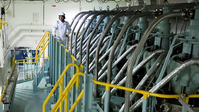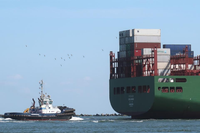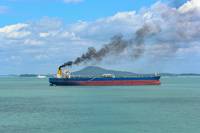
Signing a supply agreement with Hitachi High-Tech Analytical Science (Hitachi High-Tech), Wilhelmsen will supply Hitachi High-Tech’s industry-leading handheld XRF analyzers to the maritime market, enabling vessel crews to accurately and efficiently test the sulphur content of their fuel…

Publishing data about the emissions of all ships calling at EU ports, as proposed by the European Commission, will incentivize shipping companies to cut their CO2 while also better informing regulations to reduce emissions, green NGO Transport & Environment (T&E) has said…
Lloyd’s Register (LR) and University Maritime Advisory Services (UMAS) have released “Zero-Emission Vessels Transition Pathways.”The study, according to LR, aims to show what is needed to enable the transition, both at the ship and supply infrastructure level…

The port of Fujairah in the United Arab Emirates has decided to ban the use of a type of ship exhaust cleaner, becoming the latest location to impose restrictions on so-called open-loop scrubbers, a port document showed.In recent months, many…
The Cruise Lines International Association (CLIA) announced an industry commitment to reduce the rate of the global fleet's carbon emissions 40% by 2030, from a 2008 baseline.'We aspire to the International Maritime Organization’s vision of a carbon-free shipping industry by the end of the century…
Danish shipping company Nordic Tankers, Dania Ship Management and Danfoss IXA have been cooperating on testing new innovative technology for monitoring emissions on an ongoing basis.The chemical tanker company hailed that the result is a front…

Seanergy Maritime Holdings Corp. announced that it has entered into commercial agreements for the installation of exhaust gas cleaning systems (scrubbers) on five of its capesize bulk carriers before the January 1, 2020 implementation date of the IMO sulfur emission cap regulations…

There are studies and reports from classification societies, scientific organizations and governmental agencies assuring maritime industries that carbon-heavy fuel is peaking and will be replaced by 2050, if not by 2035, with zero carbon power alternatives…



